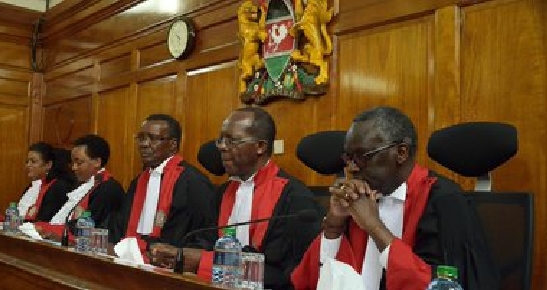The Supreme Court of Kenya made the much awaited full ruling yesterday. Five of seven supreme court judges were present to read their individual rulings. According to Chief Justice David Maraga, Justice Smokin Wanjala was not available to read his ruling as he had travelled. Judge Mohammed Ibrahim has been absent since presentation and hearing of the petition.
It took the five judges about 12 hours to read their rulings. At the end, the majority of four to two judges annulled the 8th August elections and ordered a repeat of the presidential polls within sixty days (from date of verdict). Here is what each judge said in brief.
Justice Isaac Lenaola
Justice Lenaola took issue with IEBC noting that the electoral body bore the burden for failing to prove that they complied with electoral laws and regulations. Lenaola pointed out that whatever system IEBC used must be simple, credible, verifiable and accountable.
He noted that the constitution sets the standard and IEBC cannot deviate from it. He concluded that the presidential election was null and void because of massive irregularities on account of the IEBC.
Deputy Chief Justice Philomena Mwilu
The DCJ also took issue with the electoral boady, noting that its failure to verify results was deliberate, systemic and planned. Mwilu based her ruling heavily on IEBC’s failure to comply with the Supreme Court’s order to provide full access to its servers for auditing and/or copying of data.
For this and other blatant failures, she noted that IEBC flouted the law and constitution to the extent that they became the law themselves. She ruled that the elections were null and void.
Justice Jackton Ojwang
Justice Ojwang opened his ruling by agreeing that IEBC did make mistakes on transmission and tallying of the presidential election results. However, he termed the mistakes as a result of human error and that they did not warrant annulment of the elections.
Ojwang said that the petition was based on conjecture and that the election was conducted in accordance with the law, that it was open and transparent. He dissented with the majority ruling noting that it was a political edict and not a legal one.
Justice Njoki Ndung’u
In her lengthy ruling, Justice Ndung’u said that unlike her colleagues, she took time to scrutinize the contentious forms and found no anomaly with them.
She also said that IEBC granted access to the server, going against her colleagues who said the contrary. In Ndung’u’s opinion, the nature of malpractices on IEBC’s part did not warrant nullification.
She opined that the Supreme Court should have instead ordered for a recount. She concluded by saying that the majority’s ruling was informed by political sentiments and was in disregard of the will of the people.
Chief Justice Maraga
The CJ said that the first respondent committed substantive illegalities and irregularities in conducting the elections. He added that an election marred with illegalities of such extent cannot be respected as representing the majority will of the people.
Maraga was however quick to point out that they (the judges) were unable to find specific wrongdoers who may have played a role in commission of illegalities.
[irp]
He exonerated the first and third respondents from culpability in bungling the elections. He said that the Supreme Court will overturn any election as long as it does not meet the rules provided by the constitution.


Leave a Reply